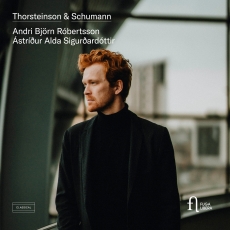Andri Björn Róbertsson - Thorsteinson & Schumann - Planet Hugill
Robert Schumann's Liederkreis Op. 24 and Op. 39 are two of the astonishing products of his year of song, 1840. On this disc from Icelandic bass-baritone Andri Björn Róbertsson and pianist Ástríður Alda Sigurðardóttir on the Fuga Libera label, Schumann's Liederkreis Op. 24 (setting poetry by Heinrich Heine) and Liederkreis Op. 39 (setting poetry by Joseph von Eichendorff) are paired with a selection of songs by the Icelandic composer Árni Thorsteinson.
Schumann would turn to Heine both for the Liederkreis Op. 24 and for Dichterliebe Op 48; the poet's extremes of elation and despair, mingled sentimentality, self-pity and ironic self-mockery, drew a strong response from Schumann. Liederkreis Op. 24 comes first, to be followed by the other great cycles, Myrthen, Liederkreis, Op. 39, Frauenliebe und -leben and Dichterliebe. The nine poems have a clear thematic and narrative sense, though Schumann's title (Circle of Songs) is rather abstract. The love affairs that inspired Heine's poems were all blighted, and Schumann's music is gentler than one might expect from text (the composer would similarly smooth Heine's bitter irony in Dichterliebe). But we should remember that though 1840 culminated in his marriage to Clara, success was not obvious and much of the music from the year alternates between elation and despair.
Throughout the cycle we have a sense of Róbertsson's thoughtful intelligence, his mellow, dark voice complemented by a poetically communicative manner and an imaginative use of colours and timbres. This is a highly poetic reading, stemming from the words, and whilst 'Es treibt mich hin' is vigorous, 'Ich wandelte unter den Bäumen' is considered, and 'Lieb' Liebchen' hushed and intimate, though developing an edge to it. The next three songs move between lyric beauty, where we can appreciate Róbertsson's burnished tone, and dramatic vigour. For all the poetry of 'Anfangs wollt' ich fast verzagen', Róbertsson's approach is quite sober. Overall we sense that his approach is one of strong emotion recalled in quietness, there is a confiding intimacy to many of the songs. The final song, 'Mit Myrten und Rosen' has a lighter feel, but there is a dark dignity too.
The composer Árni Thorsteinson was entirely new to be and a delightful discovery. Icelandic composers only began publishing their own songs around 1900, and Thorsteinson was self-educated as a composer (he was also a gifted baritone). Six of the songs onthe disc come from Thorsteinson's collection Tólf einsöngslög með píanóundirleik (Twelve songs with piano accompaniment) published in 1907 and very much establishing the composer's reputation as a beloved Icelandic composer. There is one more song in Róbertsson's selection dating from 1921/22. Thorsteinson's style is Romantic, perhaps slightly old-fashioned for the period when compared to some of the things happening in mainland Europe, but these are finely wrought and supremely atmospheric songs, and with a strong sense both of the composer's voice and the anchoring of his style in Icelandic folk melody.
We begin with Þess bera menn sár, setting a translation by Hannes Hafstein of the Danish Det bødes der for by Jens Peter Jacobsen. There are clear hints of Icelandic folk music in the melodic outlines, and from the outset we can appreciate the musicality of sung Icelandic. There is haunting lyric melancholy to the song as it cautions to tread carefully, for words and actions can cause lifelong wounds. The next five songs all set poems by Guðmundur Guðmundsson (1874-1919). The darkly characterful Kirkjuhvoll is about the belief in elves, whilst Vorgyðjan kemur is about the coming of the goddess of Spring. Though the song goes with something of a swing, there is still a sense of poetic melancholy about it. The folk influence is felt quite strongly in Friður á jörðu, the latest song of the group that asks God to grant strength and vigour to bring peace on earth through poetry and singing. The darkly concentrated Rósin, about the beauty of a woman's last moments, is thoughtfully delivered, whilst Fögur sem forðum, about two separated lovers, is complex, intriguing and rather lovely. The final song in this group is Nótt, about the loveliness of the night; a song full of dark lyrical beauty.
I loved these Thorsteinson, both for themselves and for the way that their themes and musical approach complement the Schumann, making a rather satisfying programme. And I certainly want to hear more of Thorsteinson music.
Róbertsson and Sigurðardóttir finish with Schumann's Liederkreis, Op. 39. Here the cycle of Eichendorff songs is much more of a collection rather than a thematic narrative, yet Robert would write to Clara that this was his most romantic work ever, and contained much of her! But there are thematic links, loss and loneliness, nocturnal mystery, whilst Schumann would work musical cross-references into the songs, though these are rarely obvious.
Again, we enjoy the combination of the lyric beauty of Róbertsson's voice and his attention to text and poetry. This is a very poetic reading, from the touching Intermezzo, the vigour of Waldesgespräch and the intriguingly characterful Die Stille. Mondnacht is full of still, moonlit beauty, leading to the impulsive urgency of Schöne Fremde. After a thoughtful Auf einer Burg, In der Fremde is vivid whilst Wehmut is serious and melancholy. In Zwielicht we hear the way Róbertsson's voice flows lyrically over the concentrated Bach-inspired accompaniment. Im Walde is complex, lively yet serious and full of poetry with the urgent impulsive Frühlingsnacht completing the cycle.
Throughout the disc Ástríður Alda Sigurðardóttir makes a fine pianist partner, and in the two Schumann cycles her characterful and highly poetic approach to Schumann's highly important piano writing complements and builds on Róbertsson's poetic, darkly burnished account.
Róbertsson provides both the programme note as well as the translations of the Icelandic poems. This is a fine disc indeed, with an imaginative programme combining two complementary composers and the sort of poetic performances that we will enjoy coming back to.

